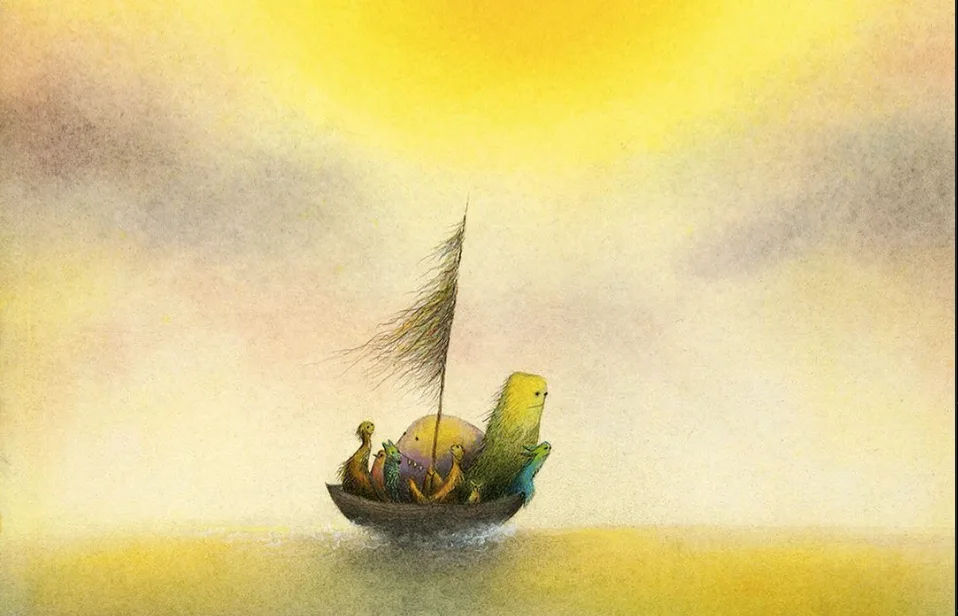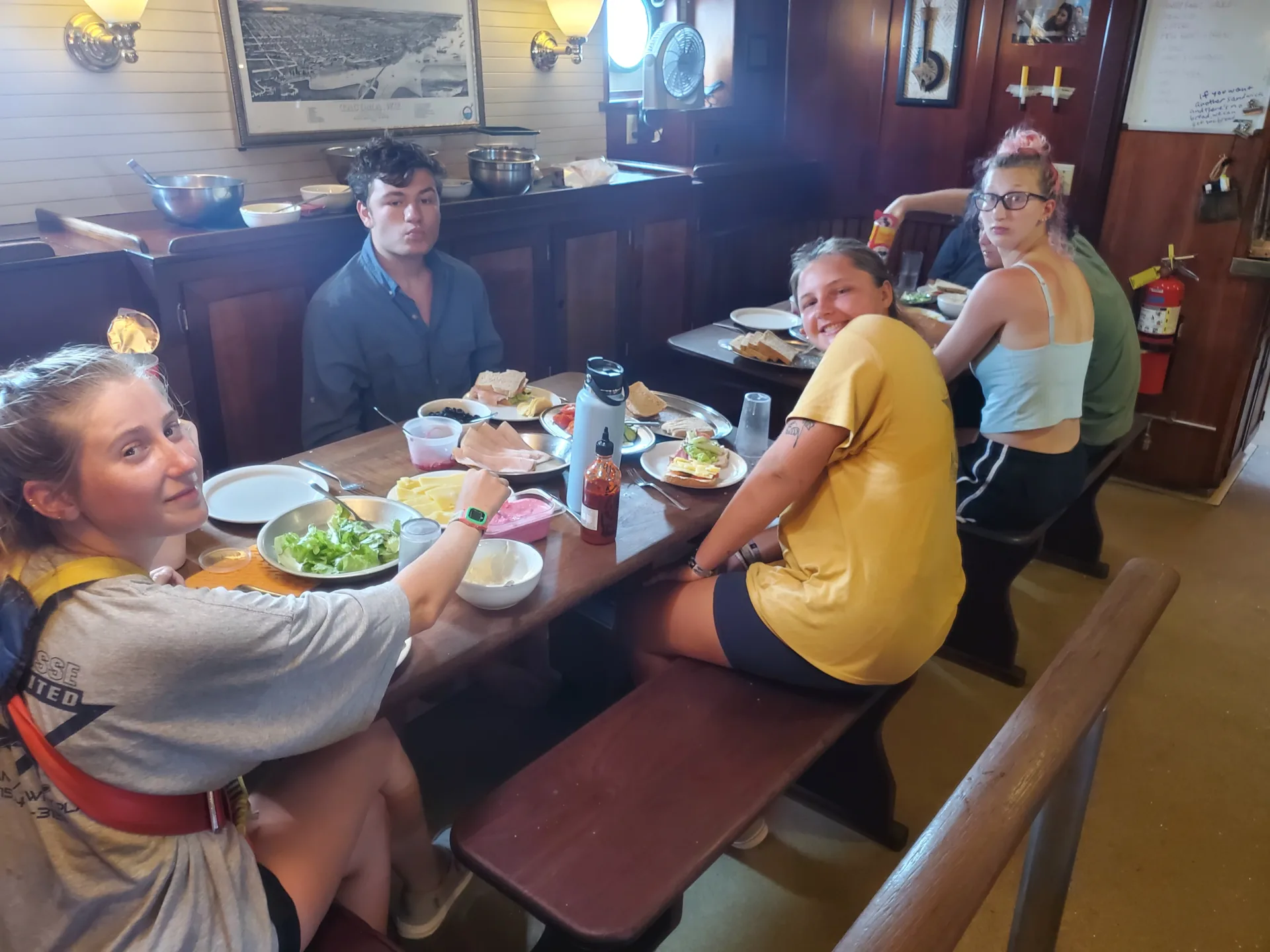Programs Blog
Scurvy Dogs

15 October 2024
Location: Tuvalu
Weather: Hotter than a firecracker.
I’m Jeff Becko, a senior at Columbia University majoring in climate systems science.
It’s been a challenging week of old school sailing through some rough seas and hot weather. The seasoning period is always difficult for landlubbers like me and this past week has been no exception. I am very impressed with all my classmates who have and continue to gut it out under extreme conditions. We couldn’t have prayed for a better captain than Captain Rick Miller. A gentleman and distinguished man of the sea and one of the finest people I have ever met.
My topic is scurvy, chosen primarily because I have always thought the insult, “scurvy dog” was so funny (for the record, the words guacamole and Chuy Kanai are also pretty funny).
Tolstoy was purported to have said that happiness is an allegory, unhappiness a story so, what better unhappy topic than scurvy.
Scurvy, an infamous disease associated with long sea voyages, is caused by a deficiency of vitamin C (ascorbic acid). This vital nutrient plays a crucial role in the synthesis of collagen, which is essential for the structure and integrity of connective tissues, including skin, blood vessels, and bones. Humans rely on external sources for this vitamin, typically found in fresh fruits and vegetables like oranges, lemons, bell peppers, and leafy greens. Historically, scurvy was the bane of sailors who spent months at sea without access to fresh fruits and vegetables.
Symptoms include:
- Fatigue and malaise
- Gum disease and tooth loss
- Joint pain and swelling
- Easy bruising and slow wound healing
- Anemia
- In extreme cases, death due to internal bleeding
Fortunately, scurvy is entirely preventable and treatable with a simple solution: vitamin C. Consuming foods rich in vitamin C or taking supplements will reverse the symptoms of scurvy, often within days.
In the 18th century, British naval surgeon James Lind conducted one of the first controlled clinical trials and found that citrus fruits like lemons and oranges were effective in preventing and treating scurvy. This knowledge led to the British Royal Navy adopting lime juice as a staple for sailors, giving rise to the nickname “limeys.”
On a research vessel, particularly in a remote part of the world like the South Pacific, the morale and well-being of the crew and scientists are closely tied to the quality of food. Everyone on board must perform physically and mentally demanding tasks, from conducting scientific experiments to maintaining the ship’s operations. Proper nutrition, including sufficient vitamin C intake, plays a direct role in ensuring that the crew can meet these challenges. Meals often become a communal event, providing a sense of normalcy and routine in an otherwise unpredictable environment. Hats off to our stewards, Toby and Tom, for keeping us healthy and always serving with a smile.
The term “scurvy dog” originated during the Age of Sail. “Scurvy” was used as an adjective to describe someone as being lowly, despicable, or contemptible, referencing the debilitating effects of scurvy. “Dog” was a common pejorative term in English for someone viewed as untrustworthy, cowardly, or unpleasant. Combining the two, “scurvy dog” became an insult implying that someone was both physically degenerate and morally corrupt. In the 17th and 18th centuries, this term was commonly used among sailors and pirates. It wasn’t just a colorful way of calling someone dishonorable—it also highlighted the harsh conditions of life at sea.
Shout out to Columbia University for all the support I’ve received over the summer preparing me for this program. Personal thanx to Brian Green and Shahid Naeem for believing in me, Bärbel Hönisch who inspired me back to the sea, Terry Planck who patiently and tirelessly has supported all my crazy ideas, and Julianna Russo whose diligence and hard work have made so much of my journey possible. Also, special thanx to Mingfang Ting, whose climate class was life changing.
Thank you to my great love and extraordinary wife, Allison who makes all things possible, and my rock star daughter, Brigitte, who inspires me every day.
For all my classmates, whom I adore:
“And once the storm is over you won’t remember how you made it through, how you managed to survive. You won’t even be sure, in fact, whether the storm is really over. But one thing is certain. When you come out of the storm you won’t be the same person who walked in. That’s what the storm’s all about.”
—Haruki Murakami, Kafka on the Shore

Recent Posts from the Ships
- Ocean Classroom 2024-A collaborative high school program with Proctor Academy
- Collaborations and Long-term Commitments: SEA’s Caribbean Reef Program Sets a Course for Coastal Programs that Compliment Shipboard Experiences.
- Sea Education Association students prepare for life underway using state of the art nautical simulation from Wartsila Corporation.
- SEA Writer 2022, Magazines From the Summer SEA Quest Students
- Technology@SEA: Upgrades Allow Insight into Ocean Depths
Programs
- Gap Year
- Ocean Exploration
- High School
- Science at SEA
- SEA Expedition
- SEAScape
- Pre-College
- Proctor Ocean Classroom
- Protecting the Phoenix Islands
- SPICE
- Stanford@SEA
- Undergraduate
- Climate and Society
- Climate Change and Coastal Resilience
- Coral Reef Conservation
- Marine Biodiversity and Conservation
- MBL
- Ocean Exploration: Plastics
- Ocean Policy: Marine Protected Areas
- Oceans and Climate
- Pacific Reef Expedition
- The Global Ocean: Hawai'i
- The Global Ocean: New Zealand